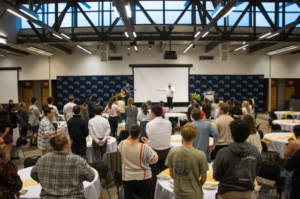From the Desk of the President: A Review of “Dad is Fat”
By President John Garvey
Over the Christmas break I watched the first season of The Jim Gaffigan Show. The show is based looselyon Jim Gaffigan’s actual life as a standup comedian, husband, and father of five living in a two-bedroom apartment in Manhattan. His wife Jeanne writes and produces the show with him. A lot of the material is drawn from Gaffigan’s 2013 book Dad Is Fat. The show is pretty funny. The book is too.
Gaffigan’s shtick used to be food. He was famous for his sing-songy Hot Pockets routine. But as he and his wife began having children they found comedy fodder in the daily tasks of parenting. The book captures the unique challenge and triumph of changing the diaper of a sleeping baby: “It’s like the Hurt Locker but much more dangerous . . . Like disarming a bomb, everything must be done in a stealth manner.” He details the similarities between the bar scene and a preschool: “In both places there’s always some strange yelling for no reason at all . . . there’s always someone crying . . . occasionally there’s a fight.” Even the title of Gaffigan’s book is taken from his life. “Dad is fat” was his son Jack’s first full sentence.
Dad is Fat is a funny book. But Gaffigan is also making a serious point in it. Having a big family, Gaffigan repeatedly notes, is not just uncommon today. It’s strange. Big families are “like water bed stores: They used to be everywhere and now they’re just weird.” My wife and I also have five children, and I know the look of shock and the sometimes impolite questions Gaffigan encounters when telling someone he is the father of five.
Why should it seem odd to have a big family? Gaffigan speculates that it’s because people imagine that having kids means lots of sacrifice and little payoff.
It is a lot of sacrifice. Describing the feeling of having his fourth child, Gaffigan says, “Imagine you are drowning. And then someone hands you a baby.” But in Dad is Fat Jim Gaffigan makes the case, one joke at a time, that the sacrifice is worth it. “I guess the reasons against having more children always seem uninspiring and superficial,” he says. “What exactly am I missing out on? Money? A few more hours of sleep? A more peaceful meal? More hair? These are nothing compared to what I get from these five monsters who rule my life. I believe each of my five children has made me a better man. So I figure I only need another thirty-four kids to be a pretty decent guy.”
Gaffigan’s kids have not only made him a better man. They’ve made him a better comedian. I’ve seen the Hot Pocket’s sketch. It’s funny. Once. Children, on the other hand, are an always surprising and changing source of joy and delight.








